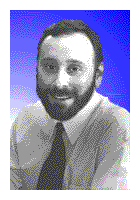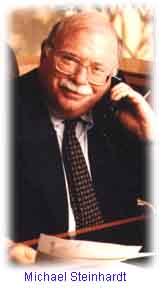
|

|
Jewish World Review / April 26, 1998 / 31 Nissan, 5758
Jonathan S. Tobin
THE GREATEST DIVIDE in Jewish life is not along Orthodox/non-Orthodox lines.
Nor is it between those who favor the policies of Israel's current
government and those who were ardent supporters of Binyamin Netanyahu's Labor party
predecessors.
There is an ongoing struggle in Jewish life that not only dwarfs these
battles in scope but transcends them in importance. I refer to the life and death
struggle going on between the all-rightniks and the alarmists.
Who are they? The all-rightniks are the people in every community who
acknowledge that American Jewry has serious problems but insist that it
isn't as bad as we might fear and that everybody is doing about as much as they
can to reverse any negative trends.
Are most American Jews functionally illiterate in Jewish knowledge? Are
intermarriage statistics posing a grave demographic challenge? Are Jewish
kids, teens and college students under served or not served at all by Jewish
institutions? Is much of Jewish philanthropy drifting more and more towards
secular causes rather than those which directly serve the Jewish community?
Is the natural process of assimilation in a free country bleeding away Jewish
identity and resources? Are Jewish leaders in touch with their constituents
or are most of them merely "big givers" or status-quo oriented professionals
with little vision?
The all-rightniks of Jewish life often acknowledge that the answer to all of
these questions is yes. But they will then point to a myriad of
uncoordinated programs that are working to combat them and express the hope that they will
cumulatively make things better. Or they will pull a survey out of the hat
to tell you that there is no real problem.
The all-rightniks have a lot going for them. For the most part, they run our organizations. And they can point to many local success stories that back them up.
The alarmists of Jewish life are the men and women who have been running
around pulling the emergency brake cord of Jewish institutions and making
everyone else's life miserable. Their biggest asset -- other than the actual
existence of the aforementioned problems -- is the traditional Jewish mind
set that life is nothing but crises. It's the old joke about the quintessential
Jewish telegram which reads "Start worrying. Details to follow."
But usually the all-rightniks are able to keep the alarmists in hand.
Whenever any of them start mobilizing support, the all-rightniks tut-tut and fob the
alarmists off with a commission of inquiry. That's more or less what happened
when George Hanus, the Chicago troublemaker who is trying to bludgeon
Federations into allocating more dollars for Jewish day schools, tried to
use the General Assembly of Jewish Federations last year as a stage for his
cause.
Which isn't to say that the GA-appointed group studying Hanus' proposal
won't issue a report. But the revolutionary impact of Hanus' cause will have been
effectively diverted.
But occasionally an alarmist comes along who is not so easy to fob off. One
such man is Wall Street magnate Michael Steinhardt, who has been using his
mega-bucks to create beachheads of Jewish continuity wherever he can create
them.
Steinhardt recently issued a manifesto of his thinking in the Forward (he
owns 50 percent of that newspaper and serves as its vice president) under the
title of "Stopping the Drift: An Entrepreneurial Vision for Jewish Renewal"
adapted from a speech he gave to a Hillel leadership conference, which was as
succinct a case for alarmism as I have ever read.
"We are engaged in a race between rebuilding (day school growth, the
emergence of B'nai Jeshrun-type synagogues, Hillel) and disintegration (intermarriage,
a decline in Zionism and a weakening of the will to be Jewish)," he wrote.
"Yet, business goes on as usual," Steinhardt continued. "The community
apparatus grinds on. There is a tone of complacency in most organizational
discussions...But, by and large, all the rabbis and professionals tell me
how well their programs are doing. But if everything is so good, why is there so
much deterioration?...Continuation of the status quo is the road to
oblivion."
Summing up the dilemma of American Jewry, Steinhardt asks: "When you are
playing a losing game --- what do you do? The answer that I propose is: change
the game. Rewrite the rules. Do not accept the status quo."
Steinhardt lists five "frameworks" which he believes have proven successful:
1. Day schools; 2. Jewish summer camps; 3. Study-in-Israel programs; 4.
Youth movement programs including Hillel; and 5. Adult learning.
And acting as a good businessman who reinforces success and tries to avoid
investing in a loser, he urges that these areas whose focus is Jewish
education be our main investment.
Even more to the point, Steinhardt looks around at Jewish life and sees an
urgent need to grow out of our American Jewish obsession with
denominationalism and intramural conflict. He wonders why so much money is
being "raised and devoted to the Jewish past rather than the present and
future."
By that, he refers to the massive fundraising by groups like the
American Jewish Committee and the Wiesenthal Center who do little to build
Jewish life but instead focus us on an outdated fear of anti-Semitism.
Steinhardt believes Jews must give more to Jewish causes and get less
toadying from Jewish organizations in return for their money. He also calls for
constant evaluation of Jewish programs to weed out the unsuccessful from the
fruitful.
Indeed, as one Jewish community professional once told me, the
difference between the for-profit world and the non-profit Jewish world is
that if a for-profit business is doing something that makes no sense, the
management can end the unprofitable practice. But if a non-profit Jewish
group is doing something that makes no sense, it has to keep on doing it in
perpetuity because of Jewish politics.
I met Steinhardt a few months ago and had the opportunity to talk about a
variety of topics with him. Though our conversation centered mostly on the
importance of independent Jewish newspapers like the Forward and the Ledger,
his ability to cut to the chase about making Jewish ideas work in a
business-like fashion impressed me. It made me think that with such a strong (and
moneyed) voice behind it, a Jewish alarmism that would allow a fundamental
re-ordering of Jewish priorities to prevail over the inertia of the all-rightniks
just might be possible.
As we prepare to celebrate the 50th anniversary of the rebirth of Israel
this week, it is appropriate to remind ourselves that the triumph of Zionism was
precisely a victory of the alarmists of Jewish life like Herzl, Weizmann,
Ben-Gurion and Jabotinsky over the all-rightniks of the Diaspora. It was also a
victory that came too late to save most of European Jewry. Let's hope this
time the alarmists like Michael Steinhardt will win the argument before the
Jews they want to save have
 All-rightniks versus the alarmists:
Focussing on the Jewish bottom line
All-rightniks versus the alarmists:
Focussing on the Jewish bottom line
 Never heard of them? In fact, the two sides are all around you. You may
actually be a member of one of those two parties without even knowing it.
And wherever you go, whether it is your local synagogue, federation or even in
Israel, the struggle is ongoing.
Never heard of them? In fact, the two sides are all around you. You may
actually be a member of one of those two parties without even knowing it.
And wherever you go, whether it is your local synagogue, federation or even in
Israel, the struggle is ongoing.
JWR contributor Jonathan S. Tobin is executive editor of the Connecticut Jewish Ledger.
4/13/98:Of ends and means and victims
4/5/98: Hang up on Albright
3/29/98: Bigshots or activists?: Clinton's three clerics return from China
3/27/98: Will American Jews help Clinton push Israel into a corner?
3/22/98: Anti-Semitism then and now
3/15/98: Still searching for Jews at the opera
3/11/98: Remembering Eric Breindel
3/8/98: Getting lost in history
3/5/98: Follow the money to Hamas
2/22/98: Re-writing "Anne Frank" - A distorted legacy
2/15/98: Religious persecution is still a Jewish issue
2/6/98: A lost cause remembered (the failure of the Bund)
2/1/98: Economic aid is not in Israel's interest
1/25/98: Jews are news, and a fair shake for Israel is hard to find